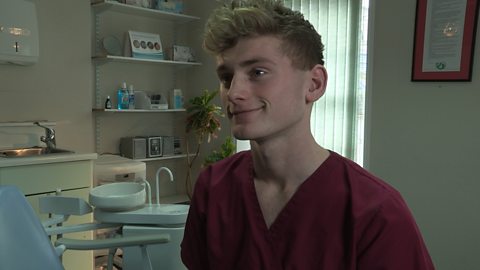NARRATOR:'High-tech engineer, dental nurse, hairdresser. An apprenticeship can be a great way to get yourself skilled up without going to uni, and earn some hard cash while you're training. There are currently over 1,500 types of job you can do as an apprentice.'
NARRATOR:'To find out more, we got together six school students. Each will discover what it's like to be an Apprentice for a Day.'
'Here's Lewis's story.'
LEWIS:Hi. My name is Lewis. I'm 17. I'm doing maths, geography, and business A-levels. My hobbies are biking… skiing… photography.
LEWIS:What I really love doing is flying those.
LEWIS:'It's like the dream, that you had when you were a child, to just take off and fly. The view is just amazing.'
LEWIS:I love everything mechanical, really, especially if it's got an engine on it.
LEWIS:'I have to get it sorted out sometimes. Instead of doing the work that I should be doing, I get distracted and start fixing things. I'd like to own my own business and be my own boss.'
LEWIS:It would have to be something that I'm passionate about. And I think it's the best way to make money. So I think an apprenticeship might be the way forward, but I don't know much about them, so I'd like to find out more.
NARRATOR:'Lewis and the other would-be apprentices meet someone who knows plenty about jobs, and how to choose the right one.'
AIMEE:So, who's watched The Apprentice on the telly?
GIRL:Yeah.
AIMEE:Yeah. Okay.
AIMEE:Well, in the real world, it isn't like that. I mean, that's very, very good TV, and it's good entertainment, but it's a bit scary. Um, and in the real world and in the environment that you guys will be going into, you will be supported, okay?
AIMEE:And in the workplace, there will be lots of people that will have your back, and will want to help you succeed.
AIMEE:Before even thinking about what apprenticeship you should take, I think it's really important that you guys start thinking about what you're good at. What's most important is that you enjoy what you do, because if you're happy, then you'll be successful.
NARRATOR:'Lewis has an in-depth session with careers mentor Aimee.'
AIMEE:You do fly helicopters.
LEWIS:Yeah.
AIMEE:And how long have you been doing that?
LEWIS:Uh, since I was 14.
AIMEE:That's incredible. How many hours have you done?
LEWIS:So, I've done 845, which I need for my pilot's license.
AIMEE:Okay. So, this isn't just something that you think, "Oh, I'd like to do that." You're actually doing it.
LEWIS:Yes. I'm actually working towards it.
AIMEE:And loving it?
LEWIS:Yes.
AIMEE:Look at your eyes light up when you talk about that. That's amazing. So, is that something that you'd like to incorporate into your career longer-term?
LEWIS:Yes.
LEWIS:Yeah.
AIMEE:Is there any reason at the moment that you, um, I suppose, at school, those type of stuff, or any jobs that you think, "I definitely wouldn't wanna do that"?
LEWIS:Um, a normal job.
AIMEE:A normal job. Okay. So, like a desk job?
LEWIS:Yeah. Oh, no, I couldn't.
AIMEE:Yeah, yeah.
AIMEE:So, you don't wanna be sat behind a desk for eight hours? Have you thought much about apprenticeship?
LEWIS:Yeah, I have, actually, because I don't really fancy going to university either.
AIMEE:Right. Okay.
AIMEE:So, I would say that possibly looking at an apprenticeship within engineering, maybe something like that.
LEWIS:Yeah.
AIMEE:What I've organized for you is to go and spend a day with one of the UK's leading engineering companies.
LEWIS:Yeah.
AIMEE:Does that sound good?
LEWIS:Oh, brilliant, yeah.
AIMEE:Yeah. Okay.Well, let's do that.
LEWIS:Brilliant. Thank you.
NARRATOR:'Time for Lewis to get suited and booted.'
LEWIS:Let's go.
NARRATOR:'Lewis will be shadowing 16-year-old Natasha. She's just a few months into an advanced technical apprenticeship with Rolls-Royce. The three-year course will enable her to qualify as a manufacturing engineer.'
NARRATOR:'Natasha starts by taking Lewis on a grand tour of the company's state-of-the-art apprentice academy. It's based to around 250 apprentices.'
LEWIS:So, what's the process for getting an apprenticeship with this company?
NATASHA:Oh, we first have to apply online. It was all online. You upload your CV, a bit about yourself, why you wanted to be an apprentice, what you thought you could bring to the company. And then after that, you got a callback, an interview.
NATASHA:You have to have a bit background knowledge about Rolls-Royce, had to look up the engines, or the company. And they test you on your knowledge of that. And then the last one was all about you. You had to bring in a project you'd done or, um, something you've been working on.
NATASHA:They'll just ask you questions about why should you be an apprentice, why should they choose you over anyone else. And you just have to really think about that and try and make yourself stand out.
NATASHA:Now, as you see the, the nozzle, it's got like a spiral on there.
LEWIS:Yeah.
NATASHA:It's scaled up to show which way the fan is turning.
LEWIS:Yeah.
NATASHA:When it's in motion.
LEWIS:Engineering is sometimes traditionally seen as a male occupation. So how is it being a female in this environment?
NATASHA:Well, you don't get treated any differently. I think the only thing maybe is just you feel more pushed to prove yourself that you can work in this environment. There's nothing that puts us back.
NATASHA:Everyone gets on and everyone is an equal. So, this is the CNC section, the computer controlled miller. We're gonna show you what happens every day now.
NATASHA:Turn it five feet.
NATASHA:Yeah. And then press the green button.
LEWIS:'Where do you see yourself being in a few years' time?'
NATASHA:'Within my role, I could go anywhere.' I could go into Capability Acquisition, which is bringing in new projects, new ideas, trying to bring it through from concept of the idea, right through to the idea being physically there. There's Continuous Improvement, which is taking an old product or an old project, and trying to see how you can make it better, how it can be improved.
NATASHA:And then there's also sort of the design side of it, new ideas, trying to bring new ideas, new concepts.
NATASHA:We do a lot of workshopping these things, and this is assembly.
LEWIS:Right.
NATASHA:I'm trying to disassemble a starter motor. It's for our Trent 1000 jet engine.
NATASHA:'Although there's a firm structure to the learning, it's also down to the individual to make the most of their training.'
5800:05:46:02 00:05:53:20NATASHA:We can sit there and do nothing if we want to, but where's that gonna get us. If we want to get somewhere, it's our responsibility to get there. We've got to self-mange, do our own work.
NATASHA:'They do help us, they do push us, but it's up to us in the end.'
LEWIS:'And are there any downsides?'
NATASHA:There's the NVQ in here, the BTEC, and then there's also additional courses, and it is a lot to take on. So it can get quite stressful when things build up. But it's worth the effort, it's worth all the hard work. And it's one of the best decisions I've ever made in my life.
NARRATOR:'It's time for Lewis to meet the boss and find out more.'
NEIL:We've got a huge range of apprenticeship programs that we have within the organization.
NEIL:Practical apprenticeships, technical apprenticeships, higher apprenticeships, but the variety of those roles is, you know, is very broad. It can be engineering, manufacturing. It can be design. It can be leadership. It can be program management. So there's a huge variety of roles that we have.
NARRATOR:'There's a lot of competition for good apprenticeship places. Some employees will train you in basic skills, but most, like this company, will want to see decent GCSE grades, or equivalent qualifications to get on advanced apprenticeships.
NARRATORAnd for higher apprenticeships, you'll require strong A-level or equivalent qualifications.'
NEIL:For the practical apprenticeship, we're looking for A's to D's in maths, English, and science, and technology-related subjects. We're also, for the technical apprenticeship program, we're looking for A's to C's, maths, English, and science.
NEIL:For the higher apprenticeship program, we're looking for A's and B's in maths and physics, or chemistry.
LEWIS:What about the personal qualities?
NEIL:For me, it's all about motivation, application, attitude. The round of skills we're looking for is the flexibility, the motivation, people who are really gonna lead their own development, and take accountability for their program, and develop themselves through a structured framework that we have in place within the company.
LEWIS:So, would you recommend an engineering apprenticeship to a young person?
NEIL:I started as an apprentice myself. I mean, think it, it gives you great foundations for the rest of your career. So, you know, I certainly would recommend the apprenticeship pathway.
LEWIS:Well, it's been a fascinating day here. I'm quite amazed at the number of apprenticeships that are available with this world-leading company in engineering. I think I might go and apply now.
Video summary
17 year-old Lewis tries out being an apprentice engineer for a day.
Lewis gets some helpful advice about how to choose a career from a leading careers mentor, Aimee Bateman.
Lewis finds out what employers are looking for from one of Britain’s leading companies, Rolls-Royce.
Josh shadows 16 year-old advanced technical apprentice Natasha Swan and speaks to her about training to be a manufacturing engineer and being a woman in engineering.
An apprenticeship can be a terrific way into a job, to earn while you learn and can offer a real alternative to University for many young people.
With school students now having to stay in full time education or training until the age of 18, this clip provides plenty of useful advice to those who may benefit from a vocational education setting.
This is from the series: Apprentice for a Day
Teacher Notes
Use this clip to illustrate one of the many ways in which pupils who enjoy science can gain further qualifications and get started on a science-related career.
The clip shows that pupils need to actively choose and manage their careers, e.g. by asking questions and planning ahead.
They can come up with a list of questions to ask a careers adviser, an apprentice and an employer about apprenticeships in the sectors that interest them.
Careers and PSHE staff can discuss what pupils need to know about apprenticeships, e.g. what they are, what employers are looking for, how to find out if an apprenticeship would suit them.
They can discuss with pupils how to weigh up the pros and cons of choosing an apprenticeship over other career pathways.
Staff can use the clip with pupils to challenge outmoded career stereotypes, e.g. that engineering is just for boys.
Pupils can research apprenticeship vacancies and other useful information at:
For information about different types of jobs and careers: www.nationalcareersservice.direct.gov.uk
For specialist advice and information, they can contact the National Careers Service helpline (0800 100 900) or talk to the careers adviser in their own school.
This clip will be relevant for teaching Business and PSHE Citizenship at Key Stage 3 and Key Stage 4/GCSE, in England and Wales and Northern Ireland.
Also at 3rd and 4th Level in Scotland.
Apprentice hairdresser for a day. video
14 year old Beth tries out being an apprentice hairdresser for a day.
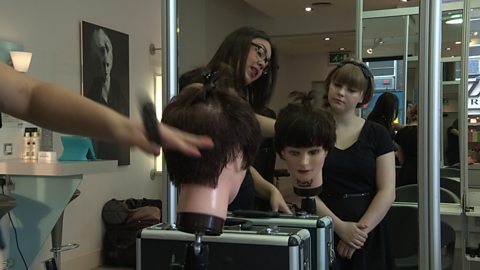
Apprentice outdoor education tutor for a day. video
15 year old Evie tries being an apprentice outdoor education tutor for a day.
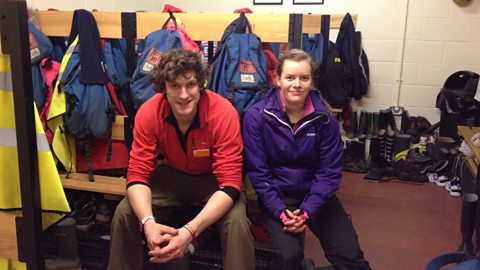
Apprentice plumber for a day. video
15 year old Courtney tries out being an apprentice plumber for a day.
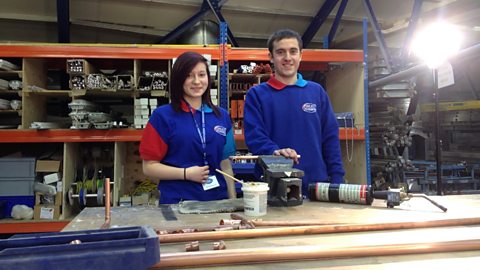
How to prepare a CV and perform in a job interview. video
Advice from careers mentor Aimee Bateman on how to create an amazing CV and cover letter plus job interview tips.
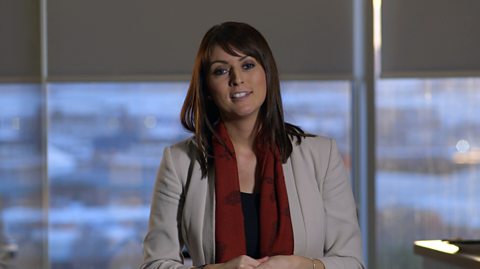
Apprentice chef for a day. video
15 year old Ellie tries out being an apprentice chef for a day.
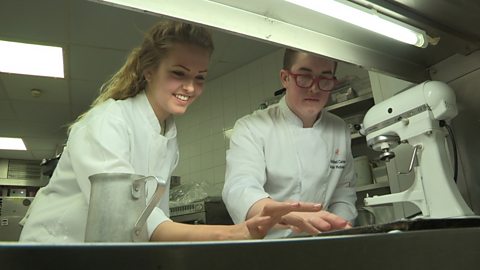
Apprentice dental nurse for a day. video
17 year old Josh tries out being an apprentice dental nurse for a day.
